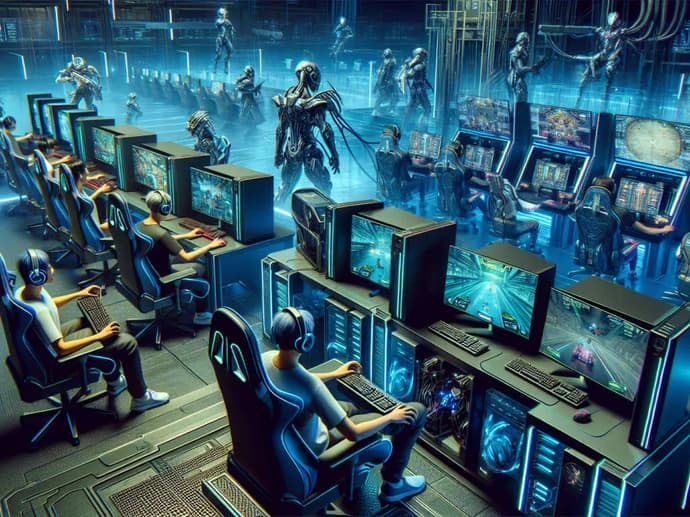
How esports is redefining the definition of a professional athlete

E-sports emerged with the popularity of games such as Space Invaders and Pong in the 1970s. With the advent of personal computers and the explosion of online gaming, competitive titles such as StarCraft, Counter-Strike and League of Legends began to dominate the scene. Over time, eSports tournaments emerged from around the world, attracting millions of spectators and professional gamers.
Despite increasing recognition through sponsorship, coverage and the inclusion of betting lines - particularly with German bookmakers listed on https://allbets.tv/de/bookmakers/, there is an ongoing debate about professional gamers being labelled 'athletes'. This debate raises an important question: What defines a professional athlete? To answer this question, here's a closer look at eSports, its unique requirements, the player requirements and the skills needed to succeed in this digital arena.
The rise of e-sports: The new era of competition
Although early e-sports games such as Space Invaders were point-scoring tournaments, e-sports as we know it today began in 1998 with Starcraft, followed by other titles such as Counter Strike, Halo and League of Legends. While Starcraft is a strategy game, games like Counter Strike and Halo are first-person shooter games where players compete against each other. Over time, e-sports took its first big step onto the global stage with the launch of the World Cyber Games in 2000, often referred to as the "Olympics of gaming". Later, the Intel Extreme Masters (IEM) was founded, which has since become one of the most prestigious e-sports events in the world. With the rise of streaming platforms such as Twitch in 2011, the e-sports audience exploded, allowing millions of fans to watch tournaments live. Leagues such as the League of Legends Championship Series (LCS) and The International for Dota 2 soon followed, cementing e-sports as a professional pursuit.
Physical vs. mental demands: What makes a professional athlete?
As the intense rivalry between England and Germany for the coveted fifth place in the UEFA Champions League shows, traditional sport has always been the benchmark for sporting excellence. However, this is only true when it comes to determining the strength of a particular region and not that of the athletes themselves.
For decades, the term "professional athlete" has conjured up images of physical endurance, muscular strength and agility on the field of play, but as e-sports become more widely recognised, this notion is being challenged by introducing a new type of athlete, athletes whose success depends not on physical strength but on razor-sharp reflexes, strategic planning and mental stamina. Here is a detailed comparison showing the physical and mental demands of traditional and electronic sports:
Category | Traditional sport | E-sport |
Physical requirements | -Traditional sports emphasise strength, agility and endurance -Traditional sports require rigorous physical training that includes weightlifting, cardio and sport-specific exercises. | -E-sports require fine motor skills, hand-eye coordination and posture management -Risks include muscle strains, repetitive stress injuries (RSIs) and eye fatigue. |
Mental demands | -Traditional sports focus on strategic planning and response to game situations and resilience -Traditional sports require proper pressure management during games. | e-sports require high mental agility, including quick decision-making, multitasking and complex strategy development. e-sports require split-second reaction times to unexpected events, situational awareness and extended focus times. |
Training programmes | -Intensive physical training, tactical drills and teamwork - Nutrition and fitness routines to maintain optimal physical condition | -Long hours of play (8-12 hours/day), strategy sessions and game replay analysis -Mental coaching, regulated sleep patterns and even physical exercise to enhance cognition. |
Level of dedication | -Years of training lifestyle adjustments and personal sacrifice -Requires balancing personal life with training and competition | -Years of training Passion and perseverance are key -Commitment to continuous improvement; risk of burnout due to intense exercise routines. |
E-sports players as professional athletes: Breaking the stereotypes
Although stereotypes portray esports players as lazy, socially awkward individuals who spend hours in their rooms in front of screens, this perception is far from accurate. Even though e-sports do not involve the same physical exertion as traditional sports, this niche has its own requirements, which we have already outlined above. As we have explored, the skill requirements in traditional sports such as football are completely different to darts, and we believe this is also true for professional players, and it is important to recognise that e-sports players are athletes in their own right. They have unique skills, train rigorously and compete at the highest level.
Conclusion: Blurring the boundaries of athleticism and the new definition of athleticism
The core requirements for athletes include concentration, decision-making and endurance. However, these are not exclusive to traditional sports. Professional players often possess these qualities in abundance. While physical strength and endurance have long been considered the primary measures of athleticism, the success of professional players shows that mental agility, strategic thinking and quick reflexes are just as valuable.
Today, the term "athlete" is no longer limited to those who excel in physically demanding sports. It now also encompasses individuals who master digital arenas with exceptional hand-eye coordination, unwavering focus and the ability to perform under high pressure. Just as traditional athletes spend years perfecting their craft, e-sports professionals invest countless hours honing their skills in order to compete at the highest level. The debate over whether e-sports competitors should be categorised as athletes has been going on for years and continues to be a hotly contested topic. Although opinions vary, it is clear that the skills required in e-sports are comparable to those required in traditional sports, albeit in different ways. Now that you have gained a deeper understanding of what it takes to be successful in e-sports, where do you stand on the issue? Is it time to expand our definition of a professional athlete?

Elen Stelmakh est une personne créative qui se consacre à l'avancement de la culture des jeux vidéo par le biais d'articles et de conceptions visuelles. En tant qu'auteur d'EGamersWorld et concepteur d'un site Web de jeux à temps plein, Elen ne se contente pas de créer du contenu, elle y insuffle également de l'énergie et de la créativité.
 Codes Roblox Anime Guardians février 2026Découvrez tous les codes Roblox Anime Guardians. Échangez-les contre des pièces mystiques gratuites, des relectures de traits, des artefacts et des récompenses.
Codes Roblox Anime Guardians février 2026Découvrez tous les codes Roblox Anime Guardians. Échangez-les contre des pièces mystiques gratuites, des relectures de traits, des artefacts et des récompenses. Casinos en ligne hors Royaume-Uni : Jeux, formats, et ce à quoi les joueurs peuvent s'attendreLes casinos en ligne opérant en dehors du cadre des jeux d'argent du Royaume-Uni attirent l'attention en raison des différences dans les modèles de licence, les portefeuilles de jeux et les...
Casinos en ligne hors Royaume-Uni : Jeux, formats, et ce à quoi les joueurs peuvent s'attendreLes casinos en ligne opérant en dehors du cadre des jeux d'argent du Royaume-Uni attirent l'attention en raison des différences dans les modèles de licence, les portefeuilles de jeux et les... Casinos en bitcoins et plateformes de jeux en cryptomonnaies pour les joueurs britanniquesLes plateformes de jeu basées sur les cryptomonnaies sont devenues un segment important du marché mondial des casinos en ligne.
Casinos en bitcoins et plateformes de jeux en cryptomonnaies pour les joueurs britanniquesLes plateformes de jeu basées sur les cryptomonnaies sont devenues un segment important du marché mondial des casinos en ligne. Les meilleurs casinos internationaux en ligne pour les joueurs britanniquesL'industrie des casinos en ligne est un secteur en pleine expansion, reconnu pour sa technologie, sa vaste bibliothèque de jeux et le montant des revenus qu'elle génère....
Les meilleurs casinos internationaux en ligne pour les joueurs britanniquesL'industrie des casinos en ligne est un secteur en pleine expansion, reconnu pour sa technologie, sa vaste bibliothèque de jeux et le montant des revenus qu'elle génère....


